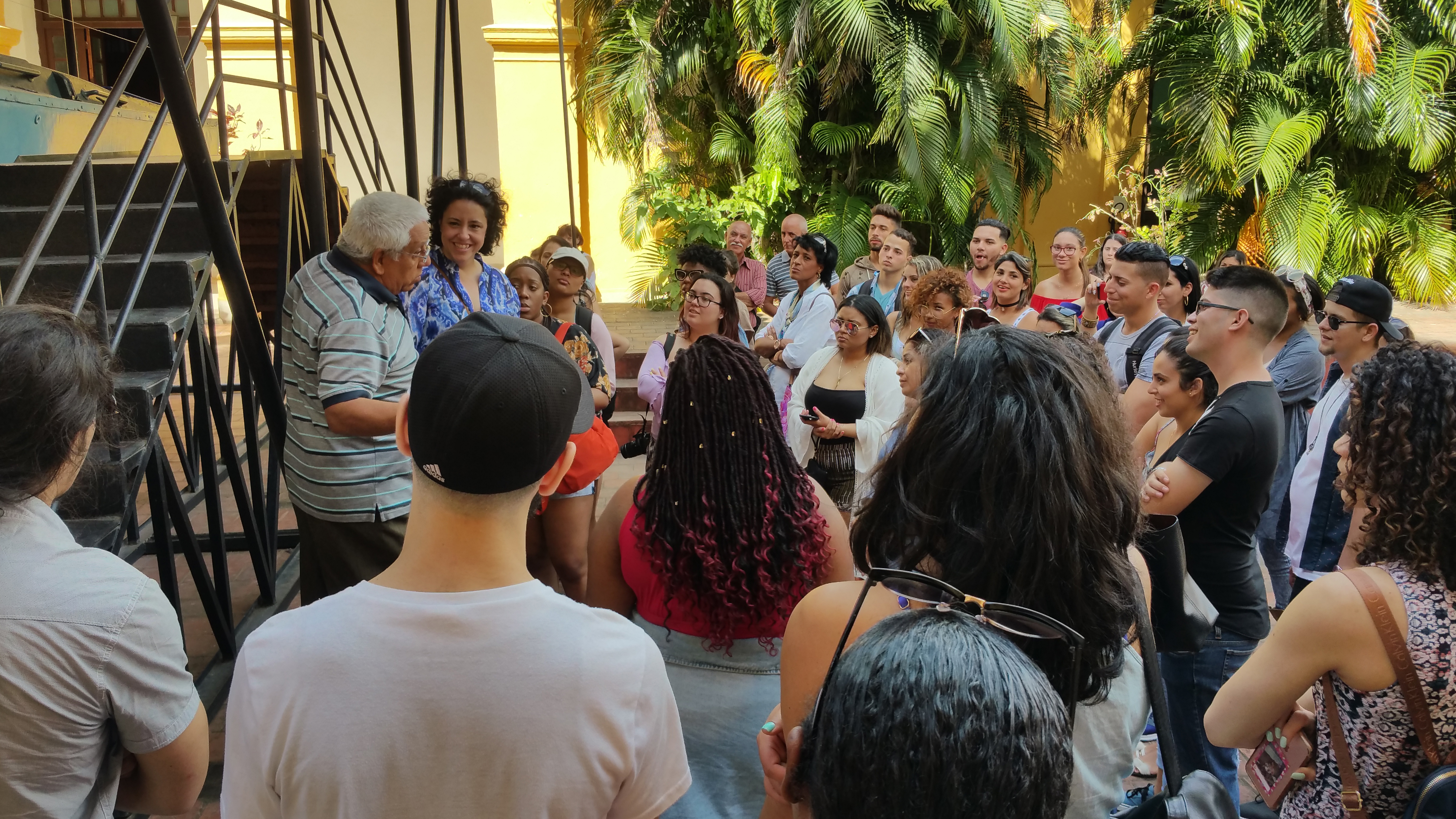Lehman in the Provinces – Cuba and US Perspectives
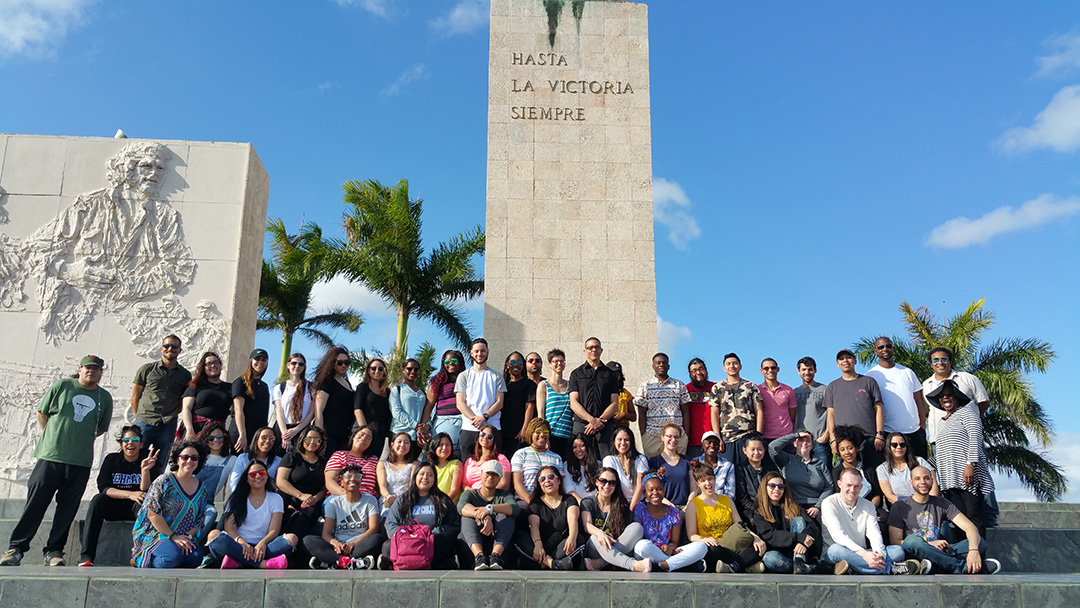
On March 31, 2018, 47 students led by five professors from Lehman College City University of New York traveled abroad to Cuba for an intensive one-week experience at the Universities of Camagüey and Sancti Spiritus. The experience consisted of four courses in chemistry, business, history and negritude designed by a team of Lehman, Camagüey and Sancti Spiritus professors led by Dr. Teresita Levy, director for the Center of Global Engagement at Lehman College. US and Cuban students engaged with each other as they learned side-by-side in lectures, workshops, a joint research project and cultural activities. The following is a series of reflections from US and Cuban students and professors on the program called Lehman in the Provinces. The program is a five year commitment among the schools.
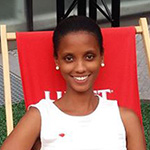 An extremely long journey to make it to Cuba. New York, New Jersey, North Carolina, Havana. After 2 days travelling, a Lehman delegation with professors and students arrived in their final destination: Camagüey, The Tinajón’s Land.
An extremely long journey to make it to Cuba. New York, New Jersey, North Carolina, Havana. After 2 days travelling, a Lehman delegation with professors and students arrived in their final destination: Camagüey, The Tinajón’s Land.
Last year, the University of Camagüey and Lehman College signed an agreement to promote academic exchanges and joint research projects for the development of both societies.
From April 1-5, Cuban students and professors engaged in an intense, fruitful and fascinating program of activities with the cosmopolitan delegation from LCNY. Everybody lived each day as if it were the last one. Was the presence of language interpreters required at every moment to ensure good communication? No.
After my first day as an interpreter, for the first time in my life I realized language barriers can be easily broken. Passion, respect, harmony, modesty, and willingness stand for the perfect combination to develop mutual learning regardless of spoken languages. Participants study Business Management, Biotechnology and Chemistry. A secret mathematical/chemical formula? No, it doesn’t have to do with that. It boils down to the French people’s motto in 1789: Liberté, égalité, fraternité.
Sayling Ley Valdés is a professor of foreign languages for La Universidad de Camagüey and also serves as interpreter for international programs.
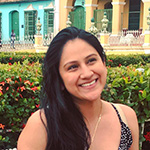
Visiting Cuba was an unforgettable and life changing experience. Never in my wildest dreams did I ever think that I would have had the opportunity to learn both academically, and culturally about Cuban roots, history, and traditions. At the University of Sancti Spiritus “Jose Marti”, I had the honor and privilege to meet and connect with students who shared their lives with me.
We had the opportunity to learn topics related to their history of slavery with UNISS students. These topics were: Negritude and Negrismo, feminism, gender roles and much more. The study consisted of learning about these topics from the Cuban perspective, different from the way we learn in the United States. The curriculum was based on a chronological lesson of significant events that happened in Cuba and how much the US played part of it. Growing up I remember not knowing the history from both sides, Latin America and the United States. It was not until I attended Lehman College to study Latin American and Caribbean Studies that I was able to learn about all of it.
Moreover, themes that really inspire me to think beyond my horizons were gender roles and feminism; topics in which I myself have had a struggle to identify since I was a child. Being in Cuba gave me the strength to stand up for something I’ve hidden for so long, I didn’t have the courage to express myself in the way I did when writing my original poem of questioning Who am I? This has been a real struggle that I have endure for so long and being able to share my sincere thoughts to a class that I only met recently, was an extremely surprising achievement for me. At home, I was raised with all men in my life, five brothers and being the only girl in the house has cost me to feel out of place. There were times when I had to put a front and play a role that confused my persona, because I had to be one of the boys, masquerading as a man in distress. Being in Cuba taught me to love myself and accept that we have people who love us despite who and what we are, I felt at home, and for the first time in my life I felt that I belong.
Liliana Ramos is a 4th Year undergraduate student concentrating in Latin American and Caribbean studies.
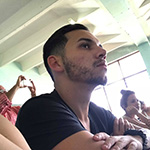 The exchange we had with Lehman College students was a good experience, for both groups I believe. We both learned a lot from each other.
The exchange we had with Lehman College students was a good experience, for both groups I believe. We both learned a lot from each other.
We were able to realize many things that we didn’t know about them. For example, that they have to work a lot in order to support their own families; some of them even have children and still go to school; in college over there no matter how old you are if you want to attend college you have the right to. Also, that college in the United States is not free at all, and that sometimes the students must work and study at the same time to pay for their education. I can’t image having to work and go to school at the same time because it must be very hard for them to be focus all the time.
Something that I learned which I thought was interesting was that Latinos are rejected by many Anglo-Americans, and that sometimes they are called criminals without really being criminals and I feel like is not right because they are human beings as well as everyone else.
I can say that the lectures we had in class with the students and our professors were interesting as well, because we got to know more things about US and our history. Most important, is that we shared a lot with them in as well as outside of class. We actually got to practice our English more than usual, we were partners and then we became close friends. I would have to say that at first, we were shy because we didn’t know them but then we got to know each other, and from that moment on the shyness was gone. I remember the first day that we took dancing class together, it was really fun dancing with them, they loved to dance, and they were good dancers too.
What else can I say… I wish you nothing but the best and good luck Lehman College. I hope we get to see each other again soon.
Reynaldo Fernandez Lage is a third-year student at Universidad de Sancti Spiritus Jose Marti. As a part of the Faculty of Pedagogy, Fernandez is a foreign languages major focusing on both English and French.
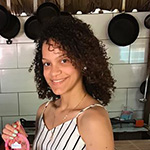 When I first told my family that I was going to study abroad in Cuba, the response I got from them was “there’s nothing to see there.” I didn’t pay much mind to their comment because my professor had talked so lovely about Cuba and the people there and visited many times. She would talk to us about how amazing Cuba is and how she loves and misses it every time she comes home and how every time she’s in Cuba she has “cara de Cuba”, meaning that she’s always happy when she’s there.
When I first told my family that I was going to study abroad in Cuba, the response I got from them was “there’s nothing to see there.” I didn’t pay much mind to their comment because my professor had talked so lovely about Cuba and the people there and visited many times. She would talk to us about how amazing Cuba is and how she loves and misses it every time she comes home and how every time she’s in Cuba she has “cara de Cuba”, meaning that she’s always happy when she’s there.
The exchange we had in Sancti Spiritus with UNISS I can say has been the best experience that I have had so far. I truly loved the experience with my classmates, my professor, the Cuban professors and all the students. The UNISS students and professors were very welcoming, and not only did I get to know my classmates from Lehman College better, but I feel like the UNISS students also got to know each other better as well. We all bonded and treated one another as family. At the end of an intense day after the lectures we would all meet in one place at a certain time to go out with our Cuban partners to get to know each other better, learn from both of our everyday life, and have a little fun.
We learned so much from them, like the fact that their education is totally free, they don’t have to pay for college to get their degree. We learned that Cubans in the university have “FEU” similar to what we refer to as “student government” in our college. We also learned that they have to make sacrifices for their country, such as that the boys have to serve in the military for a year before they start their college career which is mandatory unless they have a medical condition that prohibits them from serving. Over the course of the week, we all became good friends
During class at the university we had different discussions about Latin America, Cuba and the USA. Something that one of the professors said during one of the lectures that caught my attention was that people don’t only immigrate to the USA but that they also immigrate to Cuba. I thought this was interesting because I never considered anyone immigrating to Cuba. We visited many places, like the “Palenque de los Congos Reales”, the museum of Che Guevara, “Valle de los Ingenios”, “Cojimar”, “Parque Serafin Sanchez” and other places.
Overall, coming back to my family from my trip to Cuba with my “cara de Cuba” was something they weren’t expecting. They were happy to see how happy I was with the experience I had, and of course now they want to go visit Cuba. I know I’m definitely going back when I have the chance.
Carolina Antonio is a third year Lehman College student majoring in Latin American and Caribbean studies.
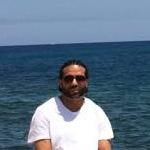 I am sitting here trying to find the right words to convey just how overwhelmingly profound my journey was to Cuba. It is a difficult endeavor to undertake, due to the absence of a similar experience from which to draw from. Never, in all of the years that God has given me on this Earth, have I been floored to the point where the words to articulate an experience have escaped me. Yet, here I am, seemingly dumbfounded by the experience.
I am sitting here trying to find the right words to convey just how overwhelmingly profound my journey was to Cuba. It is a difficult endeavor to undertake, due to the absence of a similar experience from which to draw from. Never, in all of the years that God has given me on this Earth, have I been floored to the point where the words to articulate an experience have escaped me. Yet, here I am, seemingly dumbfounded by the experience.
Here is what I know.
I was born after the age when Cuba was America’s playground. And after the Castro led revolution. And after the Bay of Pigs invasion. And after Fidel posed for pictures in a Harlem hotel room with America’s misbegotten son, Malcolm X. I was too young to remember the Mariel boatlift. The entirety of my imagery of the island was informed by an unrelenting campaign of disdain for any semblance of anything attached to Cuban. I had been bred to believe that the stench of decay from the death of hope and dreams and democracy filled the air in Cuba. The disease of dictatorship plagued the people, a people in desperate of a cure, a savior.
What I found instead was a space carved into this world, devoid of the imperialistic aspirations of other nations. A world where the political aspirations of the government were not centered on the dispelling of democracy and personal growth; it was just the opposite. It was a government that earned my respect, even if they hadn’t yet achieved the propagated political narratives that they put forth. They took steps towards systemic equality, a subject matter that my country won’t even bring up for discussion. I was made to feel welcome, in my Black skin and textured hair, into spaces where nowhere else in my country in all of my years alive have I ever been made to feel comfortable; again, it is just the opposite in my country. I am admonished for brandishing pride in my melanin, for wearing my hair in its natural state, and for not sanitizing my existence for the comfortability of others. It is a completely liberating experience to be able to simply exist without the overwhelming pressures of an ostracizing society bearing its full weight upon your shoulders. I tasted a freedom there that my country that labels itself as the leader of the free world has never provided for me.
I had entered into an Eden. I have sampled the fruit. I have acquired the knowledge. And now, I am forever changed.
Ivan Waldo is a 2nd year graduate student at the CUNY Graduate Center currently obtaining his Masters of Liberal Arts focusing on Latin American and Caribbean studies.

